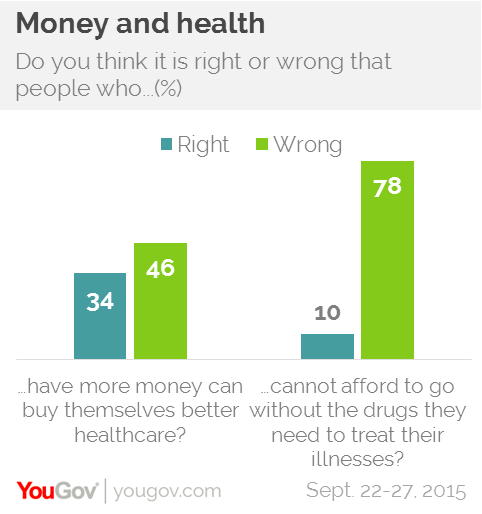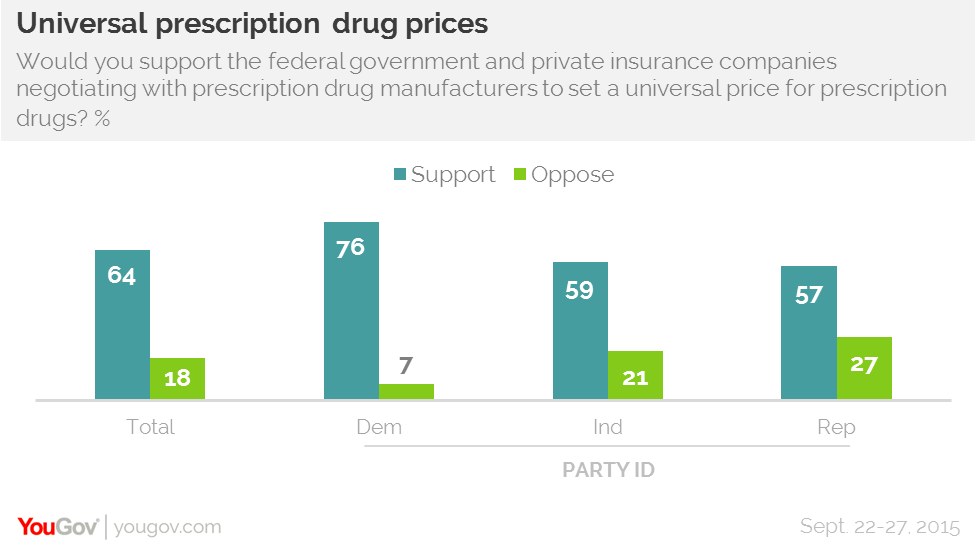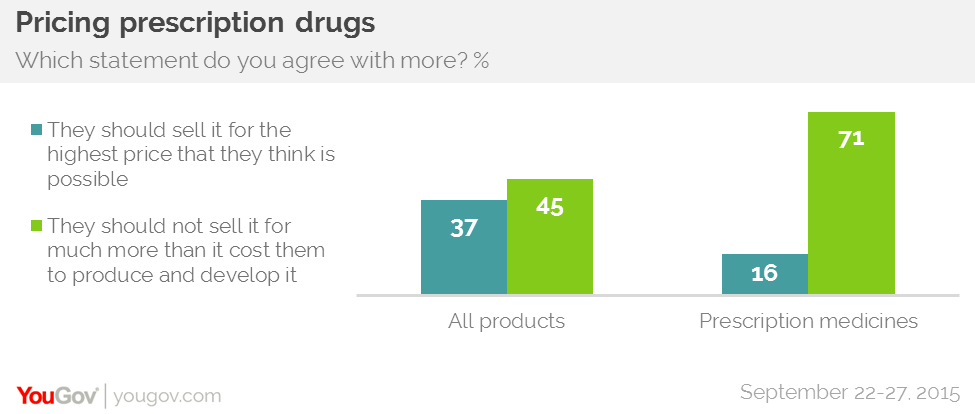Voters of all parties: let the federal government negotiate drug prices
 on
on
on
Nearly two-thirds of Americans support the federal government and insurers negotiating with drug companies to set prescription prices

Late last month a young businessman with a history of ruthless behavior shocked much of the country by hiking the price of a lifesaving drug by 4,000% overnight after he bought the rights to produce the drug. The move quickly attracted widespread attention, from industry reps who disowned the move to presidential candidate Hillary Clinton who promised to tackle similar price hikes if she became president. The price change highlights, however, that unlike patients in the rest of the developed world sick Americans are unusually vulnerable to the prices of drugs and many end up not taking necessary drugs because they cannot afford to.
The latest research from YouGov shows that the vast majority of Americans (78%) think it is wrong that people could go without necessary drugs because they cannot afford to pay for them, while only 10% think it is right. Only 13% of Republicans think that it is right that poorer people cannot afford their prescriptions, even though 50% of Republicans say that it is right that people with more money can buy themselves better healthcare, something 46% of the overall public thinks is wrong.
Under laws governing the prescription drug benefit for Medicare, the federal government is forbidden from negotiating over the price of drugs, rather they must pay the price drug companies name. A large majority of Americans (64%) support a proposal under which universal prescription drug prices would be set through negotiations between the federal government and health insurance companies on the one hand, and the drug manufacturers on the other hand. Support for the measure is bipartisan, as strong support among Democrats (76%) is matched by majority support among Republicans (57%).
Under laws governing the prescription drug benefit for Medicare, the federal government is forbidden from negotiating over the price of drugs, rather they must pay the price drug companies name. A large majority of Americans (64%) support a proposal under which universal prescription drug prices would be set through negotiations between the federal government and health insurance companies on the one hand, and the drug manufacturers on the other hand. Support for the measure is bipartisan, as strong support among Democrats (76%) is matched by majority support among Republicans (57%).


An increasingly important part of being a health care provider is knowing how much a medicine will cost, and also memorizing which health plan pays for which drug. Due to what happened with the disastrous drug bill passed under the Bush administration, it is hard to argue that government involvement on this issue has caused needless expense. It undeniably has and it has done so through a textbook mechanism of incompetence that everyone who hates government control believes is inevitable when the government is involved.
ReplyDeleteI think there is a simple way to view this, when you can buy medicines in bulk quantities,you can get them cheaper and on this point,I actually applaud Walmart. Mail order pharmacies also fill this role. However, we have multiple insurance plans and this pushes people into smaller groups and takes away the ability to negotiate, in essence, it negates market forces. That stupid Fn drug bill passed by Republicans was such a mess and even most Republicans admitted so. In the near future, and I mean literally in the next five years, wave after wave of boomers are going to hit medicare and we are not prepared for it.
I can understand the ideological fights that we have. But when we start to needlessly pay millions do billions of extra dollars, I can only hope that we will find a better way to pay for and distribute drugs.
The cost of drugs:
Delete5 billion to bring a new drub to market before the patent expires.
Drug development can generally be divided into phases. The first is the preclinical phase, which usually takes 3 to 4 years to complete.
Application to the FDA as an investigational new drug (IND). After an IND is approved, the next steps are clinical phases 1, 2, and 3, which require approximately 1, 2, and 3 years, respectively, for completion.
The manufacturer then files a new drug application (NDA) with the FDA for approval. This application can either be approved or rejected, or the FDA might request further study before making a decision.
Following acceptance, the FDA can also request that the manufacturer conduct additional postmarketing studies. Overall, this entire process, on average, takes between 8 to 12 years.
A patent is generally good for 20 years.
How many new drugs fail?
From conception to market most compounds face an uphill battle to become an approved drug. For approximately every 5,000 to 10,000 compounds that enter preclinical testing, only one is approved for marketing
I'm asking this with genuine curiosity, should we just abolish the FDA and let drug companies market whatever they want and make whatever claims they want and leave up to the participants of the market to do their own research before taking a drug?
DeleteIn just the time that I have been in the medical field, a host of new drugs have come out. Some are ground breaking, others have simply refined an existing process. My comments here are honestly not a complaint at all about the cost of drugs, they are what they are and letting the market work that out is fine. All I am saying is that when you can buy in bulk, you can negotiate a better deal.
Rather than cutting protective deals with pharmaceutical companies that cost Americans millions, the US in its many ‘free trade’ agreements ought to tell these countries to knock off the crap and if they won’t, then the US should institute the same price controls use by these countries! then when the medical research dries up... we can all bitch about poor quality medicine and legislate that pharmaceutical companies invent... immediately!
ReplyDeleteA couple of effects would be clear to people in other countries and in the US at the same time. Medicine ain’t as cheap as the world thinks it is and just as importantly people in the US will start watching state provided medical care budgets around the world hemorrhage... and then well will see just how long the the lines get and how many fewer drugs and treatments are authorized by there... 'Drug and Treatment Review and Authorization Panels'
"'Drug and Treatment Review and Authorization Panels'"
DeleteTS, just for curiosity, are you aware that this is already a mainstay of private insurance in America?
I'm not sure I get what you mean by para one. Are you saying that other countries should not push cost control on drug companies?
I am completely aware that insurance companies set limits to their coverage.. but at least for the near future, you can find plans that suit your circumstance. I believe that we created the insurance monolith and the third party carrier industry and we, given the chance can put it back in its box. We created this system directly from governmental interference in wages and outsized support for union efforts that had nothing to do with wages. You said that I couldn’t answer you about healthcare because it was too complex an issue. We certainly can bring costs in line with what the population can afford but we have to overcome one huge obstacle that makes it so complex... that is the group of people that are convinced that only the government can fix our problems. People are already saving considerable amounts on their healthcare in the US.. but they the few who self fund their care.
DeleteI am saying that drugs... the cost of research, development and marketing cost some amount. That amount sits somewhere between the prices that exist in the US and the price which is substantially lower in other countries. If the consumers in the US are subsidizing the rest of the world, that is not free trade or fair trade. As you rightly point out above... every system will have a cost break point for every procedure. Above that point they will no longer offer service to a patient. If the pharma company is over pricing a product(In the free market), they will automatically lower their price to accommodate more sales... that is a natural function of business. The problem here is that government(s) have been so involved in this relationship between customer and producer, we have no idea just what the real retail price of a drug is.... how can you possibly negotiate from that position of ignorance? At what point do governments compromise their citizens healthcare when they are blind to the real cost of a product, ‘cause if you cut out the ability to gouge US patients, I bet you find a lot of people in other countries lose access to meds at their current price point...
"I am completely aware that insurance companies set limits to their coverage.. but at least for the near future, you can find plans that suit your circumstance."
DeleteRespectfully TS, I feel like statements like this are not really honest. Factually, what you are saying is correct. My counter point is that when you received insurance through your job, you don't really have the freedom you are talking about here. Likewise, I'll concede another point, if we had no employer provided insurance, than every person would pay a price for insurance commensurate with their risk, and then we would have a genuine market system. I guess that in any discussion we need to establish that every thing is screwed up because of progressivism and the government. Okay, point made. So what do you do? I'm thinking that if we are to provide a solution that squares with your free market views, we should just abolish medicare, medicaid and also make it illegal to provide insurance through an employer. Not saying that angrily, just asking. For the gazillionth time, I don't support a single payer system for love of big government. Rather, I see it purely as a matter of running a risk pool. The bigger the pool, the better the spread of risk. Our fragmented market, IMO, has created pockets of cherry picked patients. Again, if we are going to purely self funded plans, I fully understand the mechanics of that and I'd actually agree probably a lot more than you can imagine. But, unless you run a pure free market and bar access to those wihtout insurance, it's not a free market.
I better understand your comment now, but I still see a flaw. If we shrink every transaction down to a one to one situation wherein an individual must negotiate by themselves, that is a market where the individual is still operating in ignorance. If that individual buys his medicine from a middle man like a walmart or mail order company that can buy medicine in gigantic quantities, this is a better deal, I think.
Firstly, we will not fix healthcare with the insurance and carrier middleman. They like any business found an opportunity in wage controls. What was originally offered as catastrophic major medical as a way around wage controls was picked up by unions as one more arrow in the quiver of ‘wage package’. This evolved into coverage for every bump, scrape and cough. People will always us more than they would if they were paying for it and the insurance mechanism only adds layers of cost. They have a place in the catastrophic market like car insurance or home fire insurance.
DeleteSecond is the risk pool you talk about. While there are many reasons for the current state of western citizens, a very large part of the blame must be laid at the feet of the individual yet there is no mechanism which holds them responsible for their personal conduct. Business can’t take their obvious unhealthy lifestyle into account and society can no longer call a fat person for being irresponsible much less for being ... less than attractive. Open enrollment absolves the individual yet again. The ACA doubled down on this by forcing insurance to cover pre-existing condition (understandable in the current environment perhaps but definitely wrong with respect to personal responsibility) It then takes those costs and shifts them away from the individual not only to younger people who are statistically healthier but to peers who make the effort self manage their health to a high degree.
Third is the antitrust practice of not posting prices. Any other industry would wind up in court. Things and time cost money... both are competitive in nature. Hospitals should compete openly for customers, certainly for elective and preventive care. I mentioned the self funded customer... There is a surgery in Oklahoma that opened in the mid 90’s. It posts all of its prices for surgery bundles on line and they are so cheap that the ACA has actually given them business. Because of the high deductibles of the ACA, some of the procedures cost less for the patient to travel, get the surgery and return home than it is to pull out their insurance card. As I understand, it this model has been copied by a couple of dozen other surgeries around the country. This goes to your comment about individuals operating in ignorance.. They all openly post their prices and drugs should be no different. As with anything new and under patent protection, it will cost more, but as soon as it becomes generic (and the government doesn’t create protected distributors) you will see price competition that is posted for everyone to pick and choose... You are right about instruments like Walmart. Interestingly enough, people will complain that Walmart crowds out the market like a monopoly yet seem to think that the government is a better deal... and central government is best of all.
Hand in hand with the above are personal health care accounts that are tax exempt, accumulate year on year and are inheritable. People can elect a pretax deduction from work or contribute after tax dollars that are written off a tax time. Work places can add to these accounts as some form of pay negotiation. People being in control and accountable will make wiser consumers and more considered healthcare decisions.
Here is a point on which you and I will agree. To some degree, too much water has passed under the bridge of ‘government assistance’ to take government completely out of the picture. Some people must have help that is not readily available to them. I do believe that assistance should revert back to the states... I know that one world types and central planner types disagree but states, like companies will innovate and use the best models developed by other states or countries... what you get with the central top down approach to problem solving is... one kind of deodorant type of solutions. Where I disagree with people is that the world has not ‘evolved’. We still thrive and innovated based on incentive this is true for business... society and the individual
In principle, I agree more with a catastrophic plan set up, with higher co-pays. Here at the office where I am going my clinical work, my preceptor has an excellent word of mouth reputation and has many who seek him out because he is just that good. One of the Obamacare co-ops here is closing and he has been suggesting to many patients to get a catastrophic plan and he will work with them for a reasonably cash visit.
DeleteI agree on the personal responsibility, as i do believe our insurance system works to distort cost as surely as any government program. Conceptually, if all are forced to either become educated consumers or die from their stupidity, it would seem entirely logical that sooner or later we have a human race that is smart and culled of the ignorant. Deep down, I loved this idea in my Ayn Rand days. The real world doesn't work that way, IMO. But, I can't deny there is a degree a functional truth there.
If we revert to the states, I believe most of them will simply shut the doors and leave people without access to care.
Addendum to last sentence, my reluctance for leaving up to states is that we will still be stuck with fights of social engineering and people will bitch incessantly about what they don't want to pay for. Keeping a hospital open 24-7 costs money, even when it is mostly empty. The ala cart view wherein an individual should be allowed to walk into a medical facility and pay a price for care as if it were a TV being bought at Best Buy is unrealistic. Maybe that works at the GP level, but not at higher levels. I can envision that in places where abortion is fought with fervor, they will find ways to make it unnecessarily expensive, or say that they won't offer the service, which they are basically doing by de facto law right. Meanwhile, someone like me, will still be stuck eating part of the cost of those who do now work hard enough at being healthy. I don't like this, but I see it as a reality in any plan we will create. If this is inevitable, than I say the answer is to make the risk pool as big as possible but charge a tiered price for individuals who meet certain goals such as a BMI below obesity, an A1C <6.5%, or BP or cholesterol that is at target with medicine.
Delete